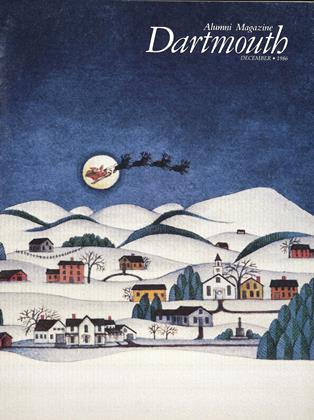The chairman of the Dartmouth College Board of Trustees, Norman E. McCulloch Jr. '50, announced on October 19 the formation of an 18-person search committee charged with finding a successor to President David McLaughlin. McLaughlin made his resignation public on October 6, saying he would leave the presidency "after the next commencement and at such time as a successor is inaugurated."
According to McCulloch, who will chair the search, the committee "is impressive in the quality and breadth of the members who were chosen by the groups they represent." The committee comprises seven faculty members, three alumni representatives, seven Trustees, and a student.
The other Trustees on the committee are George B. Munroe '43, president of Phelps- Dodge Corporation and vice chairman of the Board; Lisle C. Carter Jr. '45, a Washington, D.C., attorney; Ira Michael Heyman '51, chancellor of the University of California at Berkeley; Robert P. Henderson '53, a Boston investor and financial consultant; Ronald B. Schram '64, a Boston attorney; and Ann Fritz-Hackett '76, a Washington, D.C., management consultant.
Faculty members are French and Italian professor Colette L. Gaudin; chemistry professor Charles L. Braun; psychology professor John T. Lanzetta; and drama professor Errol G. Hill.
Dartmouth professional school faculty members are O. Ross Mclntyre '53, professor of oncology and director of the Norris Cotton Cancer Center; Clyde P. Stickney, professor of management at the Tuck School; and Daniel R. Lynch, director of graduate studies at the Thayer School.
The alumni representatives selected by Alumni Council president Mark Harty '73 are Justin A. Stanley '33, a lawyer and former College vice president; Stephen M. Mullins '54, Alumni Council president-elect; and Elizabeth Fauver Stueber '77, a. banker and former member of the Alumni Council. The student on the committee is student assembly president Wendy Becker '87.
In a telephone interview McCulloch said he'd originally hoped for a smaller committee, but because of "the need for quality input" the number grew larger. Committee members were chosen by their various constituencies, except for Becker, who was chosen by McCulloch.
Speaking of the search that will occupy the months ahead, McCulloch said, "There are no front-runners in this search no preconceived notions it is a wide-open search." The search committee met in early November to determine criteria and process for the search. According to chairman McCulloch, the agendas of scheduled Trustee meetings for the year will be changed to allow sufficient time for executive sessions to discuss the presidential search. McCulloch also reiterated an earlier statement that the proceedings of the search will be "strictly confidential." He said that after the criteria for candidates are established, the committee will not divulge any information or issue any progress reports relating to the search. He could not say if the list of criteria would be made public. McCulloch also expressed the hope that the committee members would forget their various constituencies and blend their various talents for the good of the College.
On campus, the Arts and Sciences faculty members of the search committee were selected by the Committee on Organization and Policy (COP). Among the charges of the COP is the selection of faculty members to serve on other committees. According to COP chair Professor David Lemal, the committee sought to have each major division of the arts and sciences represented; hence there are two faculty members from the humanities and one each from sciences and social sciences. The committee used the following criteria to choose among 70 faculty nominations: sound judgement and perceptions about people; evidence of real concern for Dartmouth; and contacts in academia outside of Dartmouth so that candidates in academia would be considered.
As with the other faculty members Professor Lanzetta's appointment to the committee came as a complete surprise to him. He said faculty members were chosen as individuals and not because because they represented a particular viewpoint. Lanzetta added that the faculty members of the search "will not carry a set of instructions from the faculty."
Wendy Becker's charge is somewhat different. She will gather student input and pass it on to the search committee. Becker and four officers of the student assembly will establish a committee of about ten students to draft a set of qualities a president must possess. Becker then will relate these criteria to the search committee. Becker expects this student group to disband once the search committee establishes its criteria for selecting Dartmouth's new president. Becker, however, is a voting member of the search committee.
An office for the search will be established in Baker Library. Gil Tanis '38, a Hanover resident and former director of the Dartmouth Institute, was named as executive director of the search.
The good native sense of Abraham Lincoln, the courage of Joan of Arc, and the humanitarian vision of Martin Luther King." Professor of English Donald Pease's definition of presidential attributes as told to The Dartmouth
 View Full Issue
View Full Issue
More From This Issue
-
 Feature
FeatureIn Pursuit of a Pediatrician
December 1986 By Nancy Wasserman '77 -
 Feature
FeatureLawyers, Liberal Arts, and the Cold War
December 1986 By Weyman I. Lundquist '52 -
 Feature
FeatureRichard Hovey: The Incomplete Arthurian
December 1986 By Daniel P. Nastali -
 Feature
FeatureSnowmaking at the Dartmouth Skiway: Taking the Wonder Out of Winter
December 1986 By Lee Michaelides -
 Article
ArticleMarianne Alverson: At home in many worlds
December 1986 By Lee McDavid -
 Article
ArticleHarold Sack '32: A master of pieces of the past
December 1986 By Rex Roberts
Article
-
 Article
ArticleGIFTS TO THE TROPHY ROOM
-
 Article
ArticleMemorial to Donald Morrison
MARCH 1964 -
 Article
ArticleGive a Rouse for
SEPTEMBER 1982 -
 Article
ArticleWhatever You Do, Don't Let This Guy Carry A Sketch Pad to Your Reunion
APRIL 1988 -
 Article
ArticleAlarm in Alumni Gym
JANUARY/FEBRUARY 1985 By Fred Pfaff '85 -
 Article
ArticleHanover Browsing
June 1948 By HERBERT F. WEST '22

